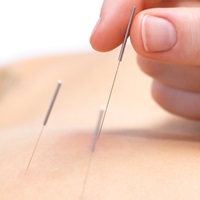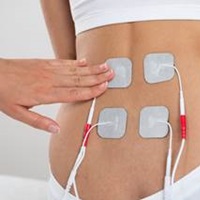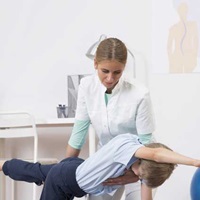Manual therapy techniques comprise of "hands-on" treatment provided by the physiotherapist. It includes joint techniques such as mobilisation / manipulation and soft tissue techniques such as deep tissue massage / trigger point release. Manual therapy also includes muscles stretching and passive movements of the affected body part. These techniques help facilitate pain relief and restore normal movement
Sports physiotherapy is used to assess and treat injuries sustained through athletic activity. The primary goal is help the athlete to regain normal, pain-free mobility and return to pre-injury activities as soon as possible.
Sports rehabilitation often involves manual therapies as well as a stretching and exercise programmes, in order to improve strength, endurance, flexibility and balance.
Our sports physiotherapy begins with the assessment of the acute injury and follows you through every step of recovery from pain relief to returning to pre-injury performance. Your physiotherapist will also give you advice with regards to injury prevention in the future.
Your first appointment will involve a thorough assessment. An individualised treatment program is then tailored to your specific athletic needs. 
Dry needling involves the use of acupuncture needles to treat myofascial trigger points that can cause acute and chronic pain; resulting biomechanical dysfunction.
Dry needling of the 'shortened' or 'tight' muscle band results in a reflex relaxation. This is accompanied by a reduction in pain and an increased range of motion.
It can be used to treat any condition where muscle pain or tightness is an issue, including:

Low-level LT is the type of laser that is used commonly in physiotherapy. Laser will have an effect of the cellular activity at the site of an injury, which will have an effect on reducing pain, inflammations and improve cell growth and thus repair of damaged tissue.
Low-level LT is used on acute and chronic soft tissue injuries commonly seen in sporting injuries and in relieving painful trigger point.
Benefits of Laser Therapy:

Shock wave therapy, also known as Extra corporeal Shockwave Therapy (ESWT), is a clinically proven and highly effective treatment for chronic soft tissue injuries and certain bone conditions.
An extracorporeal shockwave is defined as a non-evasive, non-electrical high energy sound wave that passes through the body via a hand-held probe. The shock waves produce a rapid increase in blood circulation to the target area and will break down fibrous scar tissue which builds up over time, especially with chronic conditions.
The break-down of scar tissue is the key to why shock wave therapy is so effective. Unlike normal elasticated tissue, scar tissue is non-elastic and will prevent normal movement and function, thereby weakening the unaffected tissue surrounding it, often causing further damage and pain. By increasing circulation and breaking-down scar tissue, shock wave therapy will stimulate cell regeneration and promote normal healing and rapid reduction of pain. Normal function can then be restored.
What does Shock Wave Therapy treat?
Shock wave therapy can be effective on a wide range of soft tissue and bony conditions. Here are some examples of conditions where shock wave has effectively treated and restored normal function:
To see more information on how Radial Shockwave Therapy works please visit the Shockwave Therapy website

Electrotherapy is used by to provide pain relief and promote tissue healing. The more common forms of electrotherapy we use at Cavan Physiotherapy Clinic include ultrasound, transcutaneous electrical nerve stimulation (TENS) and interferential therapy.
Ultrasound can be used on both chronic and acute conditions and is commonly used in the rehabilitation of muscle, tendon and ligament injuries, haematomas and swelling. High frequency sound waves are focused around the site of an injury by gently moving an ultrasonic head over the affected area. When applied to the various soft tissue structures of the human body it is a very soothing and gentle but effective form of physiotherapy treatment which is very beneficial in a wide range of medical conditions such as muscle strains, joint and ligament injuries.
There are three primary benefits:

Should you require surgery, our physio will work with you to ensure optimum recovery and speedy return to your normal level of function. We liaise with your consultant surgeon to ensure your rehabilitation protocol is tailored to your individual needs and expectations.

Our highly experienced physiotherapy team are able to support your rehabilitation, from the early stages of injury or pre and post-surgery, right the way through to achieving full recovery.
This is achieved by assessing the nature and extent of your injuries, utilising a combination of intensive hands-on physiotherapy, as well as gym based strengthening and mobilisation programmes. This will ensure you gain the fastest and most effective recovery possible, while limiting the risk of complications or re-occurrence of injury.

Taping and strapping techniques are commonly used by physiotherapists to treat joint instability, muscle imbalance and control oedema. Taping and strapping can also be applied during sport for the prevention and protection against sporting injuries.
Dynamic Tape is not a kinesiology or athletic tape. It is the "Original" Biomechanical Tape, an entirely new category of sports and therapeutic taping. These innovative, 4-way stretching tapes with strong elastic resistance and recoil of varying grades, absorb and inject force to reduce the workload on the body. Our taping methodology aims to directly manage load, modify movement patterns and assist function. Dynamic Tape does all this with a soft, breathable tape that is of such high quality and strength that professional athletes around the world trust our product every day. From rehabilitation to the World Cup, Dynamic Tape is changing the way we look at sports and therapeutic taping.
Ian has taught Dynamic Taping courses throughout Ireland, the UK, Europe and North America.
Biomechanics is the study of internal and external forces acting on the human body and the effects produced by these forces.
Biomechanical malalignments can lead to low back pain, hip pain, knee pain and foot pain.
Our physiotherapists can assess your biomechanics and if necessary prescribe corrective orthotics (insoles)
Neurological physiotherapy is the treatment of individuals who have neurological impairments including traumatic brain injury, stroke, Multiple Sclerosis, Parkinson's disease, Ataxia and spinal cord injuries.
We use the latest rehabilitation techniques as well as hands-on treatment to help speed up your recovery and stimulate weak muscles. Your first appointment will involve a thorough assessment. An individualised treatment program is then tailored to your specific needs.

Assessment and treatment for children aged 0-16 including:
Advice and treatment for babies and toddlers with developmental delay (including premature babies)
Neurological conditions such as cerebral palsy
Injuries such as sprains and recovery from fractures
Musculoskeletal problems relating to growth and posture
Dizziness, vertigo and balance problems can be due to a variety of reasons. However, a large number of causes come from the vestibular system. Vestibular rehabilitation consists of a thorough assessment by a Physiotherapist trained in this specific area. The treatment is exercise based and may also include manual therapy. The goal is to decrease your symptoms and in some cases, resolve them, depending on the cause of your symptoms.
If you are insured with Irish Life Health (Previously Aviva) you may be eligible for treatment under the Back-Up Programme.
The Back Up Programme is an exclusive initiative to tackle back and neck pain through early intervention, clinical case management and physiotherapy treatment.
This programme covers you for for up to 6 treatment sessions (you pay €50.00 on your second attendance and Irish Life Health cover all other costs associated with the programme).
Should you have any questions with regard to the programme please feel free to
contact us. Or call us on
049 437 2077.
